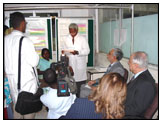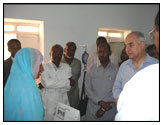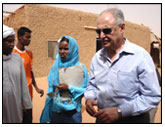
Two years after carrying out a similar visit to Alexandria, Egypt, in February 2005, Dr Gezairy, the Regional Director for the Eastern Mediterranean Region, visited sites implementing the Integrated Management of Child Health (IMCI) strategy in Khartoum, Sudan, from 24 to 26 February 2007. Sites included Khartoum University and urban and rural health facilities. Dr Gezairy also met with H.E. the President of the Republic of Sudan, H.E. the Federal Minister of Health, the Chancellor of Khartoum University and other senior health officials. This visit emphasizes the priority accorded to child health by the Regional Office and support to the IMCI strategy, which is recognized as the primary child health care strategy to improve child health in the Region.
 After meeting with the Chancellor of the University of Khartoum and the Dean of the Faculty of Medicine, Dr Gezairy visited the Paediatric Department, where he observed an ongoing IMCI teaching session with students and discussed with both senior teaching staff and students about their attitudes towards the new teaching approach. Both the teaching methodology and the holistic syndromic approach brought by IMCI were highly appreciated, as was the emphasis on a more public health and community-oriented teaching. Dr Gezairy stressed the added value of IMCI, an "integrated" primary health care approach which had anticipated the current emphasis on "integrated primary health care". The Regional Director underlined the importance of highlighting prevention in medical teaching programmes in addition to clinical care—this requiring proper orientation of teaching staff—, accrediting medical schools—based on evaluation and their community-oriented approach— and expanding the IMCI pre-service training initiative from the existing 7 medical schools to the remaining 16 in Sudan. Finally, Dr Gezairy recalled the historical background of collaboration between WHO and the University of Khartoum, observing that IMCI had opened new doors to such collaboration.
After meeting with the Chancellor of the University of Khartoum and the Dean of the Faculty of Medicine, Dr Gezairy visited the Paediatric Department, where he observed an ongoing IMCI teaching session with students and discussed with both senior teaching staff and students about their attitudes towards the new teaching approach. Both the teaching methodology and the holistic syndromic approach brought by IMCI were highly appreciated, as was the emphasis on a more public health and community-oriented teaching. Dr Gezairy stressed the added value of IMCI, an "integrated" primary health care approach which had anticipated the current emphasis on "integrated primary health care". The Regional Director underlined the importance of highlighting prevention in medical teaching programmes in addition to clinical care—this requiring proper orientation of teaching staff—, accrediting medical schools—based on evaluation and their community-oriented approach— and expanding the IMCI pre-service training initiative from the existing 7 medical schools to the remaining 16 in Sudan. Finally, Dr Gezairy recalled the historical background of collaboration between WHO and the University of Khartoum, observing that IMCI had opened new doors to such collaboration.
 Accompanied by H.E. the Minister of Health, Dr Gezairy visited a rural health facility in Khartoum and observed medical students of Africa International University undergoing their practical training as part of the community medicine teaching programme, offering a model on the links between the training, health system and community components of IMCI. Also in this case, students valued the IMCI approach, as it covered all aspects of care, from prevention to curative care. The Regional Director also joined the students during their home visits. Families were appreciative of these activities, as they put students in the real context of their future work, going beyond clinic work.
Accompanied by H.E. the Minister of Health, Dr Gezairy visited a rural health facility in Khartoum and observed medical students of Africa International University undergoing their practical training as part of the community medicine teaching programme, offering a model on the links between the training, health system and community components of IMCI. Also in this case, students valued the IMCI approach, as it covered all aspects of care, from prevention to curative care. The Regional Director also joined the students during their home visits. Families were appreciative of these activities, as they put students in the real context of their future work, going beyond clinic work.
On the third and last day, the Regional Director visited an urban health facility in Khartoum and observed "IMCI community health promoters" promoting community-based interventions, as another example of the links between health facilities and the community. Dr Gezairy commented that the IMCI strategy three components (improving health provider skills, health systems and community child health care practices) were a good model also for other public health programmes and initiatives.
Key recommendations offered as a result of the visit were the need to increase IMCI coverage in the country and accelerate its implementation and allocate financial resources also from the government budget to sustain its progress.
A press conference was held before the end of the visit.





 IMCI pre-service education: guide to evaluation
IMCI pre-service education: guide to evaluation